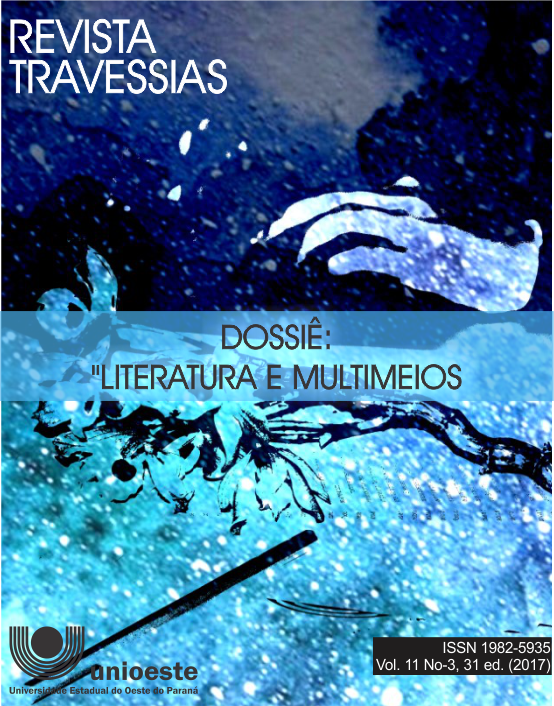Literature and multimedia: the Harry Potter phenomenon
Keywords:
Literature, multimedia, interpretive communities, globalization.Abstract
This paper, taking as an example the children's book series Harry Potter, aims to discuss and present the influences of the digital age and media convergence in the creation and maintenance of a global reach virtual community of readers and fans of the series. Paying attention to the revolutions in the concepts of literary production and reception in the digital era and working theorists such as Henry Jenkins, Néstor García Canclini, Stanley Fish, Suman Gupta, and others, this paper traces a theoretical path of literary reception, from New Critics close reading to the current scenario, in which the Internet, especially social networks, enables the formation of different interpretive communities (a term coined by Fish 1980) in the virtual world: one of them, in particular, in this work , the global community of Harry Potter readers and fans. Consolidated by advances in communication technologies, in addition to the influences of globalization, capitalism and the entertainment industry, the British author JK Rowling's series has managed to outpace the publishing market and remain relevant in two decades since its first publication, consolidated as a cultural reference for millions of readers and fans worldwide, especially for its presence in the most diverse media.
Downloads
References
ANDERSON, Benedict. Comunidades imaginadas. São Paulo: Companhia das Letras, 2015.
BERCITO, Diogo. Uso revolucionário de redes sociais ajudou Estado Islâmico, diz analista, 2016. Disponível em: http://www1.folha.uol.com.br/mundo/2016/01/1735324-uso-revolucionario-de-redes-sociais-ajudou-estado-islamico-diz-analista.shtml. Acesso em: 29 de maio de 2017.
BORGES, Thassio. Redes sociais foram o combustível para as revoluções no mundo árabe, 2012. Disponível em: http://operamundi.uol.com.br/conteudo/noticias/18943/redes+sociais+%20foram+o+combust%C3%ADvel+para+as+revolucoes+no+mundo+arabe.shtml. Acesso em: 29 de maio de 2017.
BOURDIEU, Pierre. A economia das trocas simbólicas. São Paulo: Perspectiva, 2009.
BRIGGS, Caroline. Potter premiere casts its spell, 2005. Disponível em: http://news.bbc.co.uk/2/hi/entertainment/4412936.stm. Acesso em: 19 de maio de 2017.
BUELL, Lawrence. The Dream of the Great American Novel. Cambridge: Belknap Press, 2015.
CANCLINI, Néstor García. Leitores, espectadores e internautas. São Paulo: Iluminuras, 2008.
CASTELLS, Manuel. A Galáxia da Internet. Rio de Janeiro: Zahar, 2003.
CHARTIER, Roger. A aventura do livro: do leitor ao navegador. São Paulo: Unesp, 1999.
COMPAGNON, Antoine. O demônio da teoria: literatura e senso comum. Belo Horizonte: UFMG, 2014.
COLLETTA, Denise Dalla. Sucesso de Harry Potter deve continuar nos livros digitais, diz pesquisadora. Disponível em: http://revistagalileu.globo.com/Revista/Common/0,,EMI249199-17770,00-SUCESSO+DE+HARRY+POTTER+DEVE+CONTINUAR+NOS+LIVROS+DIGITAIS+DIZ+PESQUISADORA.html. Acesso em: 31 de maio de 2017.
FISH, Stanley. Is There a Text in This Class? The authority of Interpretative Communities. Cambridge: Harvard University Press, 1980.
______. “Is there a text in this class?”. In: Alfa. vol. 36, p. 189-206, 1992.
GUPTA, Suman. Globalization and Literature. Cambridge: Polity Press, 2009a.
______. Re-reading Harry Potter. Hampshire: Palgrave Macmillan, 2009b.
G1. Facebook libera 'truque de mágica' para lembrar os 20 anos de Harry Potter, 2017. Disponível em: http://g1.globo.com/tecnologia/noticia/facebook-libera-truque-de-magica-para-lembrar-os-20-anos-de-harry-potter.ghtml. Acesso em: 02 de julho de 2017.
HARDT, Michael; NEGRI, Antonio. Multidão. Rio de Janeiro: Record, 2014.
HUFFPOST. Para a internet, Harry Potter tem a melhor explicação sobre a política do Brasil, 2016. Disponível em: http://www.huffpostbrasil.com/2016/05/13/para-a-internet-harry-potter-tem-a-melhor-explicacao-sobre-a-po_a_21696327/. Acesso em: 28 de maio de 2017.
INGARDEN, Roman. L’oeuvre d’art littéraire (1931). Trad. fr. Lausanne: Éd. L’Âge d’Homme, 1983.
ISER, Wolfgang. Der implizite Leser. Munich: Fink, 1972.
______. Der Akt des Lesens: Théori asthetischer Wirkung. Munich: Fink, 1976.
JAUSS, Hans Robert. Pour une esthétique de la réception (1975). Trad. fr. Paris: Gallimard, 1978.
______. Pour une herméneutique littéraire (1982). Trad. fr. Paris: Gallimard, 1988.
JENKINS, Henry. Cultura da convergência. São Paulo: Aleph, 2009.
LANSON, Gustave. Méthodes de l’histoire littéraire. Paris: Les Belles Lettres, 1925.
MARCUSE, Herbert. Cultura e sociedade. Rio de Janeiro: Paz e Terra, 1998.
MOIR, Jan. Harry Potter and the secret of the magic money tree: Films that made £4billion. 450 million books sold. And now a VERY lucrative stage show. Will J.K. ever stop milking cash from her creation?, 2016. Disponível em: http://www.dailymail.co.uk/news/article-3638026/Harry-Potter-secret-magic-money-tree-Films-4billion-450-million-books-sold-lucrative-stage-J-K-stop-milking-cash-creation.html. Acesso em: 19 de maio de 2017.
PRADO, José Luiz Aidar. Crítica das práticas midiáticas: da sociedade de massa à cibercultura. São Paulo: Hacker Editores, 2002.
PROUST, Marcel. O tempo redescoberto. São Paulo: Biblioteca Azul, 2012.
SODRÉ, Muniz. Best-seller: a literatura de mercado. São Paulo: Ed. Ática, 1985.
TIME. Because It’s His Birthday: Harry Potter, By the Numbers, 2013. Disponível em: http://entertainment.time.com/2013/07/31/because-its-his-birthday-harry-potter-by-the-numbers/. Acesso em: 14 de junho de 2016.
Downloads
Published
How to Cite
Issue
Section
License
Creative Copyright Notice
Policy for Free Access Journals
Authors who publish in this journal agree to the following terms:
1. Authors keep the copyright and grant the journal the right of first publication, with the work simultaneously licensed under the Creative Commons Attribution License, which allows sharing the trial with acknowledgment of authorship and initial publication in this journal.
2. Authors are authorized to take additional contracts separately, for non-exclusive distribution of the work version, published in this journal (eg publish in institutional repository or as a book chapter), with acknowledgment of authorship and initial publication in this journal.
3. Authors are allowed and encouraged to publish and distribute their work online (eg in institutional repositories or on their personal page) at any point before or during the editorial process, as this can generate productive changes, as well as increase both impact and citation of the published trial (See The Effect of Free Access).
Creative Commons License
This work is licensed under a Creative Commons Attribution–NonCommercial-shareaswell 4.0 International License, which allows you to share, copy, distribute, display, reproduce, completely or part of the work, since there is no commercial purpose, and authors and source are cited.



